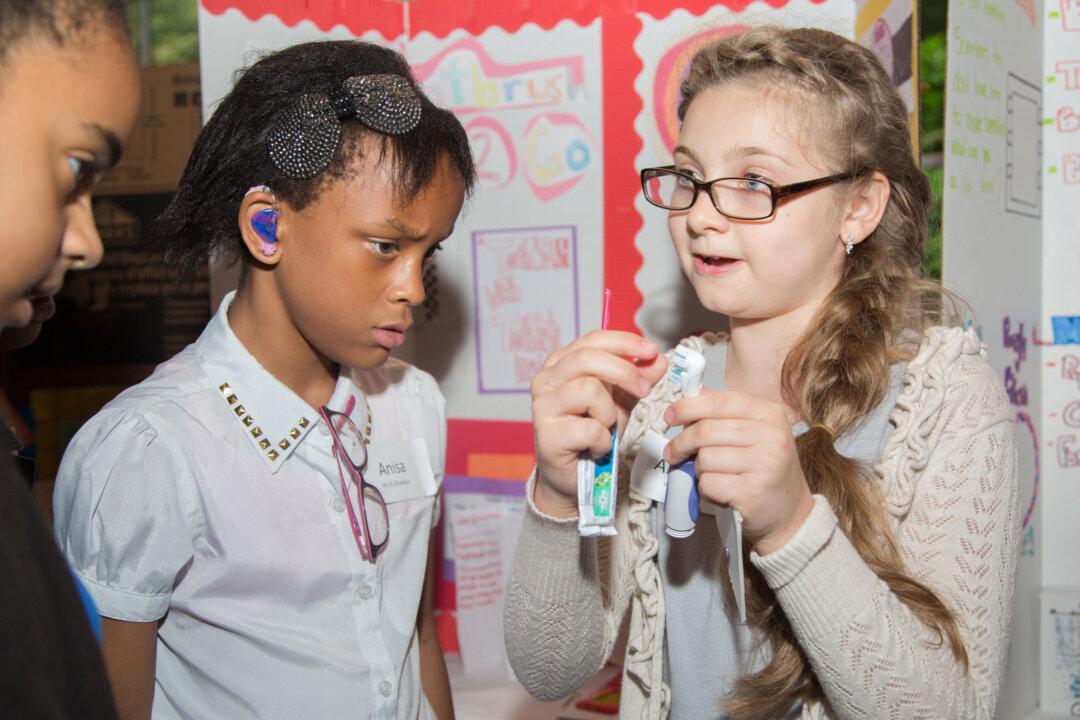NEW YORK—Kassandra Mendoza and Anisa Solomon stood nervously by a table at the Loeb Boathouse in Central Park, waiting for a noon luncheon with a Blackstone employee where they'll pitch their business idea.
The bar won’t serve them drinks to calm their nerves though, because Kasandra and Anisa are still students in elementary school.
Their product idea is called the Kids Pillow, a music-playing pillow on wheels that helps students relax.
“A lot of kids are stressed out, they need to cool down and listen to music,” said Anisa.
“Especially when it’s test time,” Kasandra added.
The two students are from PS 45K in Brooklyn, one of the 10 schools involved in the Tomorrow’s Entrepreneurs project, which aims to instill the enterprising spirit in over 1,200 students all over New York City. The students are between 8 and 12 years old.
“The communities they live in, most people aspire to simple jobs, like Walmart, they don’t have high expectations, and we want the kids to have high expectations, and to see themselves potentially as being really successful, ” said Ila Gross, executive director at LEAP—Learning through an Expanded Arts Program, the non-profit that created Tomorrow’s Entrepreneurs.
The students with the best 54 ideas earned the privilege of meeting employees from top financial firms to discuss their business ideas at Wednesday’s luncheon.
The program, now in its second year, sends consultants to teach classes on entrepreneurship to students from disadvantaged neighborhoods, guiding the students step-by-step to come up and create their own ideas for businesses and inventions over the course of 14 weeks.
“There’s some brainstorming in the first few sessions, what is the problem you’re going to solve, and think about how to solve that problem, ” said David LeBlanc, program coordinator at LEAP, “Then they start to think about how to turn that solution you’ve come up to into a real business, a real venture.”
Anastasia Svetlova, an 11 year old from the PS 199K school in Brooklyn, made a model of her product idea, ToothBrush2Go, an environmentally friendly toothbrush that also carries toothpaste. It took her two weeks to make the model, which is an electric toothbrush with a battery slot replaced with a small toothpaste tube.
The program seems to be working well for Anastasia, who says that the program has kindled in her an interest in entrepreneurship.
“You’re like boom, I’ve created an idea, and now I’m thinking more about it, maybe a business,” she said.
The children came up with ideas that not only addressed life’s minor discomforts but also tackled broader social issues.
“A lot of them wanted to do apps, game apps, a lot of the kids wanted to make apps that would help kids that were being bullied, to deal with the situation they were in, and these apps had games that would take the stress away. That was amazing for me, ” said Laverne Christie, a teacher at PS 224 Brooklyn.
The Blackstone Foundation provided $60,000 for the first year of the program.
“The hope is that by introducing entrepreneurship to them now, that it'll just continue to have them spark ideas, because it’s been proven that if you have one idea, you’re more likely to have another idea,” said Lindsey Cohen, Foundation Administrator at Blackstone.





